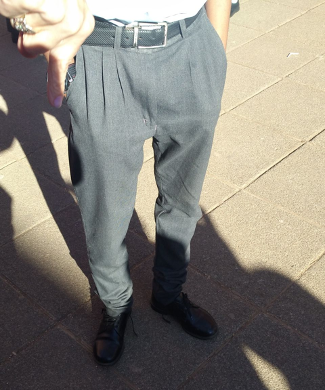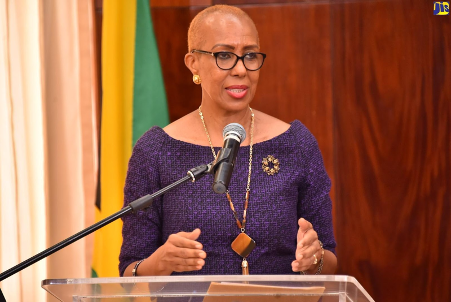By Cecelia Campbell Livingston
President of the National Parent Teachers’ Association, Stewart Jacobs believes the draft grooming policy that has been promised by the Ministry of Education and Youth, should have be given to the schools from June and not at the beginning of the school term as was pledged.
In a bulletin to regional directors, school board chairmen and principals
of all public educational institutions on September 4, the Education Ministry stated that the policies and guidelines are to be shared and discussed
with the staff, students and parents, so that the necessary steps are taken
toward implementation for this academic year.
Jacobs feels that giving school administrators the policy from June would have allowed them time to tweak their internal system for the new school year. Parents would have also been given an opportunity to sign it.
“It’s a draft policy, and the final draft has not been done, so I don’t see it really being totally ready for the first week of September. It might be further down in the school term,” he said.

“It’s a bit awkward to introduce a policy now when school term would have started. Parents would have gone to the barbers already, and all the mohawks will be coming in and the mohawks will be sent out, and all the tight pants will be coming in and all the tight pants will be sent out,” he quipped.
Jacobs foresees that it might cause some disruptions, and expressed the hope that good sense will prevail. He also cautioned parents to look very closely at what they have signed on to, as he pointed out that rules are rules and they are set most of the time to protect.
Giving insight on what the grooming policy is about, Jacobs explained that there are three basic pillars that own schools in Jamaica. There are trust schools, church schools, and government schools, with trust and church schools having their own policies and rules.
“What the grooming policy basically states is that there is now an understanding that the school has the right to put in place its policy as far as grooming and deportment are concerned. And the government will facilitate what the school has in place. However, if the school is infringing on the rights of the child or the rights of students overall, then the government now has the authority to come in and enforce that the rights of the child aren’t infringed on,” he explained.
Jacobs noted that schools have the right to demonstrate what they consider right and proper grooming. For children of Rastafarians, he said it is an established world religion now, and it is something that we as Jamaicans should be very proud of, being a small country.
“Our schools ought to allow Rastafarians to come to school and to wear their lock and to practice their religion as per that expression [of] wearing their lock,” he stated, adding, “why should they be locked out of school as a result of that?”
Throughout the last school year, there were instances of schools turning away students who breached the grooming policies. In January of this year, Edith Dalton James Secondary in Duhaney Park locked out several students for grooming violations. The following month, Kingston High students suffered the same fate, and last year, Godfrey Stewart High also locked out students.
Education minister Fayval Williams stated in her comments on the Final Draft Student Grooming Policy that she is aware that public educational institutions operate in a variety of settings and contexts, under the supervision of responsible boards of management, and in accordance with rules set by the minister with responsibility for education.
She also observed that the Ministry is aware that there are cultural dynamics and differences of opinion as to what may be considered appropriate and relevant to the child’s education.

“We know that each generation has its own sense of style—of what looks fashionable and what makes them look “cool and attractive”. At the same time, there is a growing emphasis on student-centred learning, diversity, and social inclusion that challenges traditional notions of conformity typified by uniform requirements. In addition, there have been significant developments in the law in relation to public administration, human rights, and anti-discrimination, coupled with a greater awareness on the part of both parents and students as to the avenues available to challenge school disciplinary decisions,” she wrote.
According to her, the Students’ Dress and Grooming Policy in Public Educational Institutions is developed to empower institutions as they seek to equip learners with the requisite skills and competencies for the 21st century, requires general guidance for schools, and establishes a general framework for treating students with dress and grooming, taking into consideration cultural identity, climate situation, socio-economic considerations of parents, and the aims of the educational institution. Its framework clarifies the Ministry’s stance to reduce discriminatory practices in schools while addressing the need for discipline and the development of societal values.
A section of the draft policy states that, “Students are often told to be proud of their African heritage; however, this becomes difficult when this same heritage is used as a pretext for discrimination.” It also recommend that a clear definition be created for ‘neatly groomed’. “This should prevent schools from shifting the line in the sand at their own discretion.”






